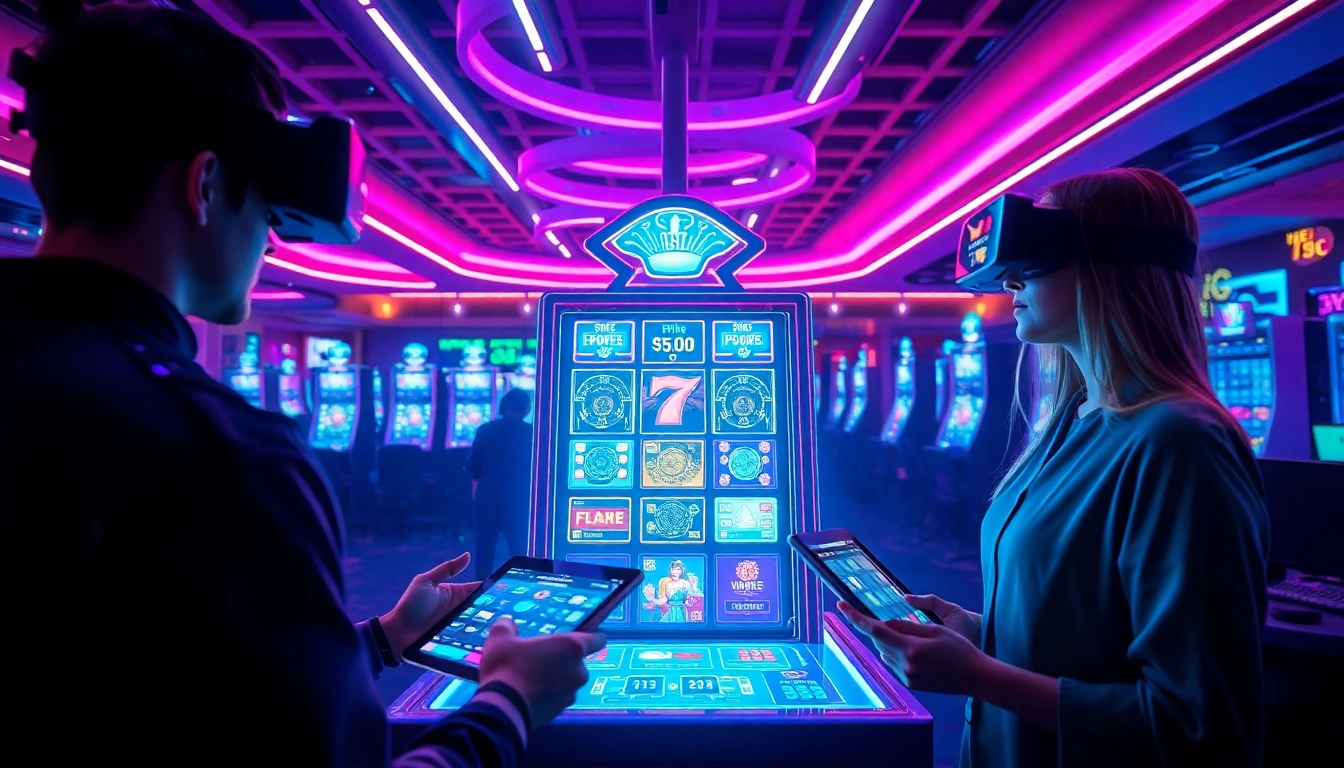Understanding New Technology in Online Gambling
As the digital landscape continues to evolve, the gambling industry has taken significant strides in integrating new technology. This innovation not only enhances operational efficiencies but also transforms the player experience. In this comprehensive exploration, we delve into the core concepts surrounding new technology within online gambling, examining its evolution, impact, and the trends that are shaping the future of this dynamic sector.
What is New Technology?
New technology refers to advancements and innovations that harness modern tools and techniques to improve processes, products, or services. In the context of online gambling, this includes the use of advanced software, AI, blockchain, virtual reality (VR), and mobile platforms. Each technological advancement introduces new possibilities for operators and players alike, providing more engaging, secure, and accessible gambling experiences.
The Evolution of Casino Gaming Technology
The evolution of casino gaming technology has been marked by significant milestones, each contributing to the sophisticated landscape we see today. Initially, casinos were limited to physical locations and traditional gaming methods, such as slot machines and table games. However, the advent of the internet in the late 20th century paved the way for online gambling, allowing players to access their favorite games from anywhere at any time.
As web technologies progressed, so did online casinos. The introduction of live dealer games created a blend between land-based and online experiences, using real-time video streaming to connect players with human dealers. More recently, the integration of mobile technology has made gambling more portable than ever, putting entire casinos in the palms of players’ hands.
Impact of New Technology on Player Experience
New technology has dramatically transformed player experiences in several ways. It enhances engagement, increases accessibility, and fosters community among players:
- Enhanced Engagement: Features such as immersive graphics and sound design in online slots and table games captivate players, making their experience more enjoyable.
- Increased Accessibility: With the proliferation of mobile devices and the improvements in internet connectivity, players can gamble anytime and anywhere, significantly expanding the player base.
- Fostering Community: Social features, including live chats and multiplayer games, have been integrated to create a sense of community among players, enhancing the overall experience.
Top New Technology Innovations in Casino Games
Virtual Reality: Immersive Gameplay Experience
Virtual reality (VR) has emerged as a groundbreaking technology in the casino gaming sector. By leveraging VR headsets, players are transported into a digital environment that simulates the realistic experience of walking through a casino. This immersive gameplay offers heightened interaction with the game and the environment, as players can virtually place bets, walk around, and interact with other players and dealers.
Several casinos have begun developing VR games designed specifically for this technology, allowing players to engage in familiar gambling activities in a completely transformed atmosphere. As VR continues to advance, its potential for creating deeply engaging and interactive experiences will likely lead to more widespread adoption in the industry.
Blockchain: Enhancing Security and Transparency
Blockchain technology is revolutionizing online gambling by enhancing security and transparency. One of its primary benefits is the decentralized ledger system, which ensures that all transactions are recorded immutably and securely. This makes it virtually impossible for fraudulent activities, such as cheating or money laundering, to occur.
Blockchain also provides players with full visibility into the fairness of games, as transactions can be verified through smart contracts. This transparency cultivates trust and encourages more players to engage with online platforms, knowing that their funds and gameplay are secure. Cryptocurrency payments further enhance this aspect, offering anonymous and efficient transaction methods for players concerned about privacy.
AI in Gambling: Personalized Gaming Experience
Artificial intelligence (AI) is playing a crucial role in tailoring individualized gambling experiences for players. By analyzing player data, AI algorithms can recommend games that fit players’ preferences, skill levels, and betting habits, thus enhancing user satisfaction and retention.
Additionally, machine learning models are used to detect patterns of behavior that may indicate problem gambling. This allows operators to intervene proactively, ensuring responsible gambling practices are upheld.
AI is also being utilized for customer support, with chatbots providing immediate assistance and personalized responses to inquiries, further improving the player experience. The combination of AI and big data analytics is paving the way for the next generation of gaming platforms, ensuring they cater to players on a more personal level.
New Technology Trends Shaping the Future of Sports Betting
Live Betting Enhancements Through AI
Live betting, or in-play betting, has gained immense popularity among sports bettors. The introduction of AI technology is significantly enhancing this experience. AI analyzes live game data in real-time, allowing sportsbooks to adjust odds and lines dynamically based on unfolding events.
This swift adjustment provides bettors with more comprehensive and accurate information as games progress, leading to more strategic betting opportunities. Furthermore, AI can predict outcomes based on historical data and current game conditions, helping bettors make informed decisions.
Mobile Betting: The Rise of On-the-Go Gambling
Mobile betting is witnessing an exponential rise as more players opt for convenience in their gambling habits. With smartphones being ubiquitous, sports betting platforms are investing heavily in mobile-friendly interfaces and apps that facilitate seamless betting experiences.
These platforms deliver live odds, real-time scores, and easy navigation, enabling bettors to place wagers quickly and effectively from virtually anywhere. As mobile technology continues to advance, we can expect further innovations aimed at enhancing the mobile user experience, including augmented reality features and improved camera integrations for scanning QR codes at sporting events.
Data Analytics: Making Informed Betting Choices
Data analytics is transforming the sports betting landscape by providing bettors with in-depth insights into player statistics, team performance, and historical trends. By utilizing big data, sportsbooks can create more accurate models for predicting outcomes, helping players refine their betting strategies.
Moreover, with the increasing availability of data, betting markets are becoming more efficient. Bettors can access valuable resources, such as analytics-driven insights and expert predictions, that empower them to make informed decisions based on data rather than intuition alone. This reliance on analytics is set to redefine betting strategies and foster a more competitive environment among bettors.
Challenges in Implementing New Technology
Regulatory Implications for New Technology
The rapid pace of technological advancement in online gambling brings significant regulatory challenges. Governments and regulatory bodies must establish frameworks that address the unique aspects of new technologies, such as blockchain and AI. This ensures consumer protection and fair play while fostering innovation within the industry.
However, the lack of uniformity across jurisdictions complicates the implementation of these technologies. Operators must navigate a labyrinth of laws and regulations, which can slow the adoption of innovative solutions that enhance player experiences and operational efficiencies.
Ensuring Fair Play With Advanced Technology
As technology evolves, maintaining fairness within the gambling landscape remains a top priority. The complexity of algorithms and the anonymity offered by cryptocurrencies pose additional challenges for regulators. Operators must invest in robust systems that ensure fairness in game outcomes and safeguarding player data.
Moreover, the use of AI to monitor gameplay for suspicious behavior must be transparent and unbiased to prevent discrimination or unfair treatment of players. Developing standards for fairness and compliance will be crucial in maintaining trust between operators and players.
Technology Implementation Costs in Casinos
Implementing new technology within casinos incurs significant costs, which can deter operators from investing in the latest innovations. From infrastructure upgrades to employee training, the transition to advanced systems requires careful financial planning. Operators must weigh the benefits of new technology against these costs to determine if the investment can yield sufficient returns.
Moreover, smaller operators may lack the resources to adopt the latest technologies, placing them at a competitive disadvantage. To level the playing field, industry stakeholders should advocate for financial support and reduced regulatory barriers that promote the adoption of new technology across all casinos, regardless of size.
Measuring Success: Performance Metrics for New Technology
Key Performance Indicators for Online Casinos
To assess the effectiveness of new technology in online casinos, operators must define and track key performance indicators (KPIs). These metrics provide valuable insights into player engagement, revenue growth, and operational efficiency. Important KPIs include:
- Player Retention Rate: Monitoring how well casinos retain their players over time is crucial in evaluating new technology’s effectiveness.
- Revenue Per User (RPU): This metric measures the average revenue generated from each player and can indicate how effectively technology enhances the gaming experience.
- Cost Per Acquisition (CPA): Understanding the costs associated with acquiring new players helps assess marketing strategies and technology effectiveness.
User Engagement Metrics and Technology Adoption
User engagement is another vital metric for measuring the success of new technology. Tracking how frequently players log in, the time spent playing, and the diversity of games they access can provide insights into how technology is influencing their gambling behavior.
Additionally, technology adoption rates among players are critical to determine whether innovations resonate with users. Operators should take note of how quickly players embrace new features, such as mobile betting capabilities, and adjust their strategies accordingly.
ROI on Technology Investments in Gambling
Calculating the return on investment (ROI) for technology investments in the gambling sector is essential for justifying expenditures. Operators must assess the direct financial impact of technology, including revenue increases and cost savings, against the implementation and ongoing maintenance costs.
To accurately measure ROI, businesses should consider both short-term gains and long-term advantages, such as improved player satisfaction and loyalty, which can contribute to sustained revenue growth. Continuous evaluation of technology investments will ensure operators maximize their returns while maintaining a competitive edge in the evolving gambling landscape.




